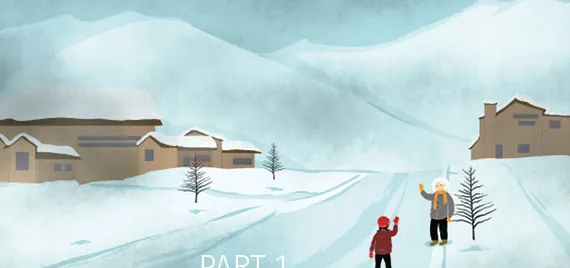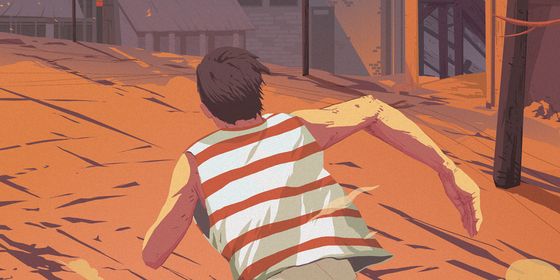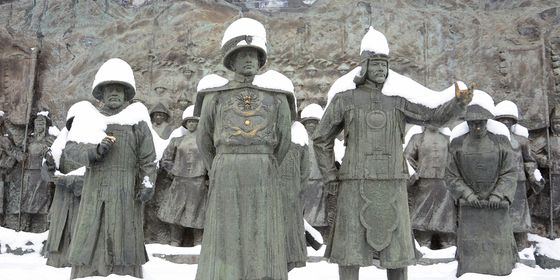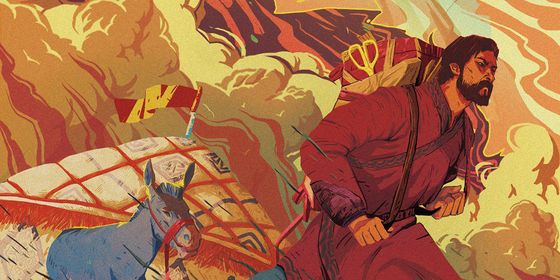Winter is always quiet and it will always happen again
About the Author: LI JINGRUI 李静睿
Li Jingrui first gained fame as a talented student writer in high school, then an insightful blogger under the name “Ahua’s Ithaca” (阿花的伊萨卡岛), now a popular writer and columnist. Her style is deeply realistic and her strength lies in the portrayal of the ordinary with rich and lively detail, stimulating the senses and the imagination.
It felt like daylight had come early, but only in a pale blue. There were no clouds. That heightened the effect of the sickly whiteness that seeped through the pallid sky. This was winter in the small city—a perpetual lack of sun and a blanket of white fog that turned everything into sludge. It was hard to say if the mist was formed by cool air or dirt. All I knew was that my nostrils were raw and I wished I could stop breathing until I was back indoors.
I went out wrapped in so many layers that I looked like a ball. During the winter my coat rarely got washed. It had been a vibrant crimson when I first bought it. But over time the hue sank into pale red. I refused to wear calico oversleeves. I hated raising a garish yellow or sky-blue forearm in class. The sleeves always rubbed on the desk while I did homework, the cuffs turning a polished grey and black bits crumbling off at the slightest wipe. The little bits were humiliating. At 14 years old I had read that author Eileen Chang was also embarrassed by her faded red cheongsam: “The color of ground beef, I had to wear it to no end, it was as if my whole body was covered in frostbite.” I later read that once she was earning money she went to Hongkou to buy Japanese cloth for a new gown. It was printed with, “palm leaves that half hid a Burmese temple.” Wrapped in my old, greasy mianyi (cotton-padded coat), I imagined that I would have a day like hers in my future.
I was in four pairs of trousers, layer over layer, and the jeans couldn’t contain the gaudy edges of my woolly pants. All I could do was stretch my sweaters down in desperation. They all had warped lower hems and it looked like I was draped in piles of clown rags. My woolly pants were weaved from yarn ripped out of old sweaters. Crimson and emerald, purple-blue with some ginger-yellow, imaginative thread ends dangling all over…I was warm enough to be sure. The last bits of wool were used to knit socks that bulged in my pelt-lined boots. That style of shoe was made of brittle, fake leather and usually came in black. I liked red, but everyone said red attracted dirt, and in those days the word “like” wasn’t considered practical. The laces were long and could loop around the ankle a few times. A bit of polish gave the boots character while the iron rings in the heels thudded against the road. I’d only worn them once or twice, but the fibers of the lining had started to fall out and stick to the soles of my socks. Washing couldn’t remove them. They needed to be picked off one at a time. Sitting at school for hours, my feet would turn as brittle as the fake leather. The cold didn’t bother them when I walked home. I could only feel them hurting until they turned numb. Once home, I soaked them in a basin of boiling water. It would take a while before I cried out in pain.
I dragged my feet into the heavy blanket of fog and made a small detour toward my fourth aunt’s house. The store she ran from home wasn’t open yet and my grandmother was sitting outside the door on a rattan chair. She was a blotched grey ball, swathed in clothes that had long lost their color and long gone out of style. Her forearms were covered with grass-green oversleeves that had a duck pattern and her fat, misshapen fingers showed through the earth-red wool of her mittens. Every morning she sat like that on the rattan chair. We could never figure out at what time she woke—was it before the sky turned pale, or after?
I stepped up to the chair and asked, “Jiajia, (in our city we called maternal grandmothers ‘jiajia’, I never once called her by the common title ‘waipo’), did you eat breakfast?”
“I ate a bowl of tangfan.”
“So did I. And Mother pickled some turnips yesterday; we had them with chili oil.”
“I pickled artichokes. I ate them plain, without chili oil. Do you want another bowl of tangfan? It isn’t cold yet. I made it with rice gruel.”
“No thanks, I should get to school.”
By the time we finished speaking, the warming vapor produced by that morning’s tangfan and turnip was starting to dissipate. I was glad I had a good excuse to leave. I walked into the fog toward my school. The classroom light had just come on and I could see a faint orange glow in the distance. I walked faster. Quickly, I wanted to reach that orange glow quickly. Even if the classroom was just as cold as outside, it was my future. Behind me, she was still sitting on her rattan chair, waiting for the next visitor. Maybe it would be my cousin just out of bed, or my father rushing to work, or my aunt coming downstairs to open her shop, asking her, “Did you eat breakfast?”
“I had a bowl of tangfan.”
Then she would ask them all to try her pickled artichokes, plain, without chili oil, and her piping hot, milky white, tangfan made from rice gruel.
But no one did.
It was a quiet winter. She sat in her rattan chair. A blotched grey ball.
“A Quiet Winter” is a story from our newest issue, “Military”. Make sure to come back and read part 2 tomorrow.
To read the whole piece, become a subscriber and receive the full magazine. Alternatively, you can purchase the digital version from the iTunes Store.












